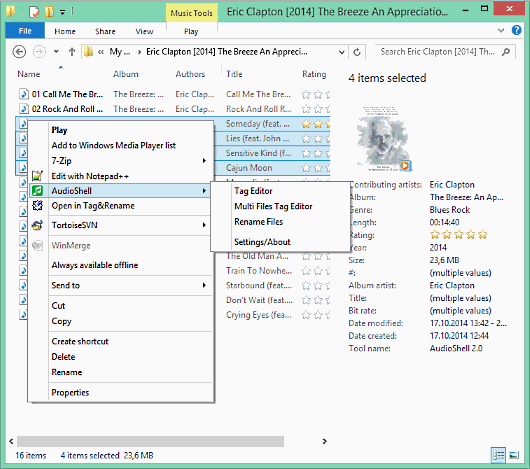filename — Name of file
character vector | string scalar
- How To Edit Properties Of Wav Files File
- How To Edit Properties Of Wav Files Windows 10
- Edit Audio Files Windows 10
Edit your WAV file. You can select parts of the wavelength by tapping and/or dragging your finger on the screen, and then use the icons above the editing space to make changes. For example, select a portion of the waveform then tap the Effects tab and you can see all the effects you can apply to the sound. There are a few free programs out there that can support meta tagging for WAV files. Here are a few: Audacity (For Sound Designers, Music Producers, etc) Mac, PC, Linux Audacity is a full multi-track editor, but it has.
Open WAV Files Click on the Open button on the toolbar and select the WAV files that you would like to edit. Once you've selected the WAV files, click on the Open button to load the WAV files into Dexster. If you want to edit properties of a.mp3 file on Windows, you can follow these steps: 1. Open Windows Explorer and locate the.mp3 file. Right-mouse click on the.mp3 file and select 'Properties'. You see the file properties dialog box. Click the 'Details' tab. Click the 'Value' field of the property you want to edit. Supports variety of formats. Allows online metadata lookup. Easy-to-use interface.
Name of file, specified as a character vector or string scalar that includes the file extension.
Depending on the location of your file, filename can take on one of these forms.
| Current folder | Specify the name of the file in Example: | ||||||||
Other folders | If the file is not in the current folder or in a folder on the MATLAB® path, then specify the full or relative path name in Example: Example: | ||||||||
Remote Location | If the file is stored at a remote location, then
Based on your remote location,
For more information, see Work with Remote Data. Example: |

Example: 'myFile.mp3'
Example: '../myFile.mp3'
Example: 'C:tempmyFile.mp3'
audioinfo supports the following file formats.
| Platform Support | File Format |
|---|---|
| All platforms | WAVE (.wav) |
OGG (.ogg) | |
FLAC (.flac) | |
AU (.au) | |
AIFF (.aiff, .aif) | |
AIFC (.aifc) | |
| Windows® 7 (or later), Macintosh, and Linux® | MP3 (.mp3) |
MPEG-4 AAC (.m4a, .mp4) |
How To Edit Properties Of Wav Files File
On Windows 7 platforms (or later), audioinfo might also return information about the contents of any files supported by Windows Media® Foundation.

On Linux platforms, audioinfo might also return information about the contents of any files supported by GStreamer.

Example: 'myFile.mp3'
Example: '../myFile.mp3'
Example: 'C:tempmyFile.mp3'
audioinfo supports the following file formats.
| Platform Support | File Format |
|---|---|
| All platforms | WAVE (.wav) |
OGG (.ogg) | |
FLAC (.flac) | |
AU (.au) | |
AIFF (.aiff, .aif) | |
AIFC (.aifc) | |
| Windows® 7 (or later), Macintosh, and Linux® | MP3 (.mp3) |
MPEG-4 AAC (.m4a, .mp4) |
How To Edit Properties Of Wav Files File
On Windows 7 platforms (or later), audioinfo might also return information about the contents of any files supported by Windows Media® Foundation.
On Linux platforms, audioinfo might also return information about the contents of any files supported by GStreamer.
How To Edit Properties Of Wav Files Windows 10
audioinfo can extract audio metadata from MPEG-4 (.mp4, .m4v) video files on Windows 7 or later, macOS 10.7 Lion or higher, and Linux, and from Windows Media Video (.wmv) and AVI (.avi) files on Windows 7 (or later) and Linux platforms.
Edit Audio Files Windows 10
Data Types: char | string
